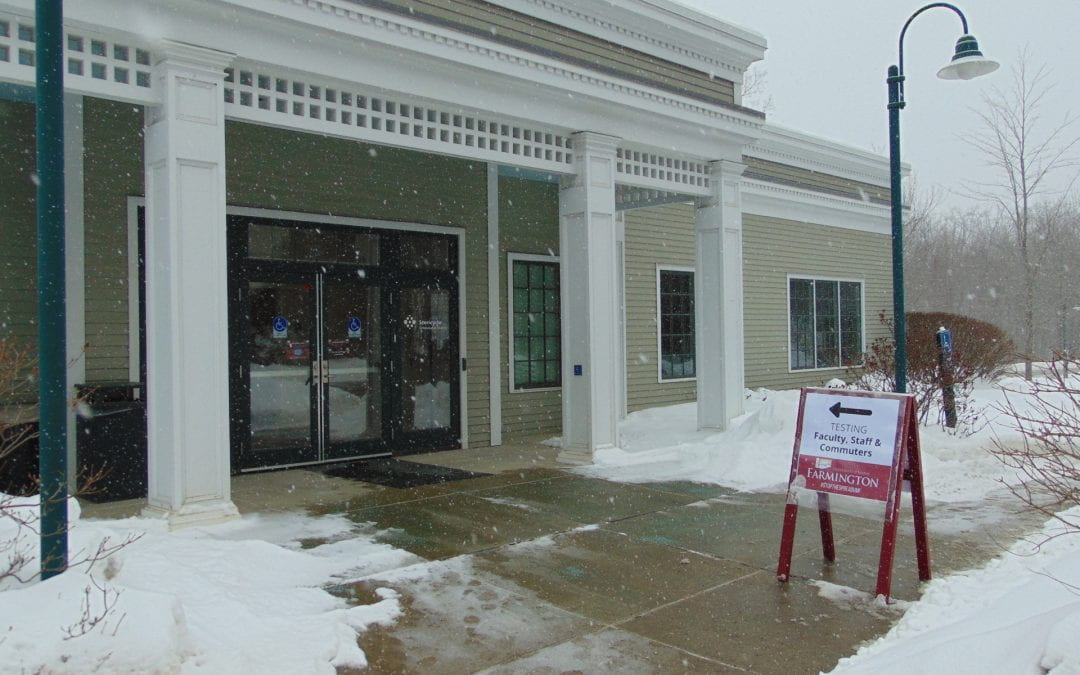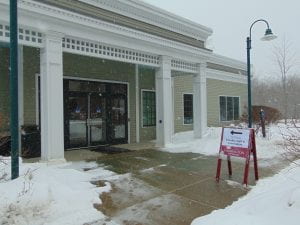Apr 7, 2021 | Feature, Sports |
By Paige Lilly, Contributing Writer
The UMF Athletics Department recently announced the start of its Racial Equity Committee (REC), which aims to create a safe environment where racially marginalized students can share their experiences while also working to make an impact here on campus. The REC announced its official presence on Monday in an Instagram post.
The group began soon after Molly Wilkie was named the UMF Athletics Diversity and Inclusion designee, a new role the NCAA now requires schools to have. As part of a group of people with this same designation at their respective Maine Division III (DIII) Universities, Wilkie realized that UMF was one of the few schools yet to have a group of this type. “I learned that many of the other schools had coalitions and groups specifically for their student athletes of color [the names of the groups are all slightly different],” Wilkie said in an email. “After learning about what other schools were doing I thought it was something vital that UMF athletics should be engaging in as well.”
Wilkie then reached out to a number of students-athletes who she thought may want to be a part of the group. “Molly emailed us and asked if it would be something we were interested in,” said Chloe Horn, a junior, field hockey player and a member of REC. “I believe she got the list of our names from our various coaches. Then we were able to set up our first meeting.”
Wilkie stressed the importance of student leaders like Horn in the success of the group thus far. “Although I am facilitating this group, it is all about the student-athlete leaders and working to support and amplify their voices and ideas,” said Wilkie.
The group aims to provide students who identify as non-white with a safe space to discuss their experiences. “Our group … wants to create a safe space for racially marginalized student-athletes for support and advocacy,” Wilkie said. “The group also wants to play a role in helping to educate about and identify the racial inequities that exist on our campus.”
“It’s the start of a conversation many students here don’t realize needs to be had,” said sophomore Mullein Francis, who is a nordic skier for UMF and a member of REC. “Because we all go to a school that is mostly white, I think a lot of people think, ‘Oh, it’s rural Maine, we don’t have to worry about that here,’ but in reality we do,” said Francis. “There are a lot of people here who deal with this kind of thing, and it’s good to be able to talk about it with people who understand.”
In fact, it’s that understanding that sparked the friendship between Horn and Francis. “We didn’t know each other before the group, it kind of started our friendship,” Horn said, sharing a laugh with Francis.
In that way, they believe the group is already beginning to be successful in bringing students who identify as non-white together, but they won’t stop there. “We have a lot of big goals,” said Francis. “We are thinking about eventually hopefully having a system where we can include other students as well, not just student athletes.”
However, Francis and Horn both agreed that the group needs a strong foundation before they can move to that goal. “We’re so ambitious, but we know that if we get too excited and try to move too fast it might hurt us in the long run. We know we need to build the group so that it’s strong, doing little events before big ones,” said Horn. In these efforts, these student-athletes believe they will be able to start an important conversation that lasts even after they graduate from UMF.
Any questions about REC should be brought to their Instagram account @umf_rec or emailed to Molly Wilkie at molly.wilkie@maine.edu.
Mar 6, 2021 | Archives, Feature, News |
By Paige Lilly, Contributing Writer
Before the pandemic, tutoring was one of the most readily available services for students at UMF. At almost any time, students could walk into the Mantor Library and there would be a tutor waiting to help them with their needs. Additionally, students could set up times to meet with tutors in specific subjects.
However, COVID-19 has made these services more difficult to access. Without searching, it would be easy for students to assume that tutoring services are currently available. However, tutoring is still a service that can be used by students if they need it. Cassidy O’Donnell, a sophomore actuarial science major who has been working as a tutor for the computer science department and the learning commons since the beginning of the academic year, has been a tutor since the beginning of this year. Therefore, pandemic-style tutoring through Zoom is all she has ever known.
The style of tutoring is different for each job. “The computer science department creates a flyer of all of their tutor’s zoom meetings and the times. Then the department emails it out to their students,” said O’Donnell. “Students are free to come to the sessions whenever they need help.”
There are multiple tutors for the department, most of which do not overlap with each other. O’Donnell says that this is convenient because students can check the list and find a time with a tutor that works for them.
With the Learning Commons, students control the schedule instead. “Students can schedule appointments using the Navigate app or online through Navigate, which is accessible through MyCampus,” O’Donnell said. In the Navigate app, students are able to select their tutor, the time for the session, what subjects they need help with, and any additional information they would like to provide to their tutor. This allows students and tutors to find times that work with their busy schedules.
Mullein Francis, a sophomore biology major and tutor, is also employed through The Learning Commons tutoring program. She highlighted a few challenges that tutoring on Zoom has presented. “It can be hard when tutoring subjects like math, when you really just want to point to something on the paper to show them,” said Francis. “When you’re on Zoom, you have to work with the camera, switching between writing things on your paper and holding it up to show the person you’re tutoring.” Although this is a struggle, Francis said that tutoring over Zoom has generally been a positive experience.
One thing that Francis likes about tutoring over Zoom is the flexibility that it offers for both the tutor and the student. “It’s nice because Zoom meetings can be a lot easier to fit into my schedule,” Francis said. “When you’re in person, it can be harder to find a time that works, because you have to factor in the time to physically get to the meeting, which can make it tricky.”
O’Donnell enjoys the positive impact that tutoring has on students. “The tutoring program is confidential so students don’t have to worry about tutors talking to each other or other students about them,” O’Donnell said.
Francis also encourages students who need some extra help to sign up for a virtual tutoring session. “School can be so stressful,” she said. “It’s rewarding to be able to help people get rid of some of that stress.”
To schedule a tutoring session with the Learning Commons, download the Navigate app on your smartphone’s app store.

Feb 18, 2021 | Archives, News |
By Paige Lilly, Contributing Writer

274 Front St. by Sam Shirley
As the new semester begins, UMF has opened the doors of a new COVID-19 testing center intended for the testing of commuter students, faculty, and staff.
Residential students will continue to be tested in Dearborn Gymnasium, while others will be tested at the new center located at 274 Front St. The new testing center will continue to help with social distancing while testing, along with minimizing interactions between residential and commuter students. “You can only do so much [to minimize student interactions] in terms of classes, but I definitely think it’s going to make a huge difference in terms of people’s safety,” said Jessica Howe, the COVID-19 Testing Coordinator.
Howe believes that with the large volume of students being tested this semester, the new testing center will keep crowds down and allow for better social distancing than Dearborn Gymnasium would alone. “With too many people, you can’t social distance or make a proper line in [Dearborn Lobby],” Howe said.
During the fall semester, students, faculty, and staff were randomly selected to get tested in each phase of testing. However, according to an email sent out by Christine Wilson on behalf of the Asymptomatic Testing Team, all students, faculty, and staff who “live on campus, take or teach classes on campus, work on campus, or participate in student athletics” are required to be tested every week this semester in Phase 6 of UMF’s asymptomatic COVID-19 testing.
Getting the word out about that has been another challenge Howe and her team have been facing, but signage and frequent emails have been a factor in overcoming this challenge. “We’re encouraging people to set a time to be their designated testing time every week,” Howe said. “We want people to put it on their calendars and then go through and sign up with us.” This is not required, but Howe believes that it is a great way for people to remember to get tested every week.
Elena Guarino, a sophomore, is one of the students who has tested at the new testing center. “It was interesting because I had never been to that site on campus before so it was a little tricky trying to figure out where to go,” said Guarino. “There is only one entrance [into the parking lot of the building], which I didn’t realize, so I ended up missing it the first time I drove by.”
Troy Johnson, a junior, said he appreciated being able to see the same style of posters that would usually hang on the student center walls in the testing center. “I lived on campus for two years, so being in the student center was a daily occurrence for me,” Johnson said. “Now, I live off campus and because of [COVID-19], I don’t really go [to the student center] much.”
Howe is also excited about the potential that the testing center has for communication with commuter students. “I’ve been trying to hang posters up similar to what would be seen in the student center in order to connect with students in that way.” Her main goal is to keep students, faculty, and staff both safe and engaged in their testing experiences.

